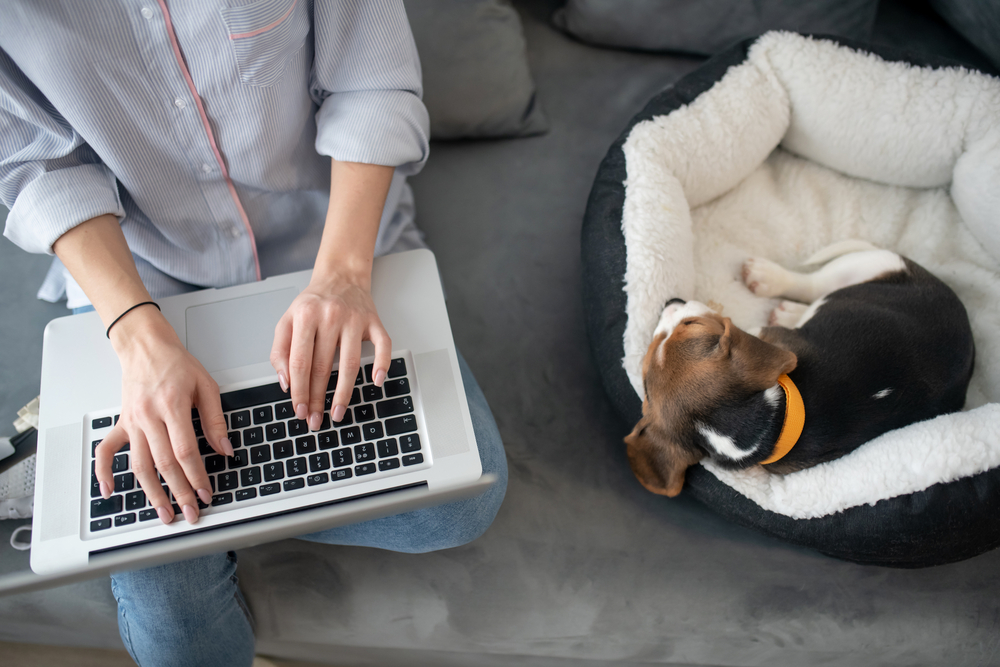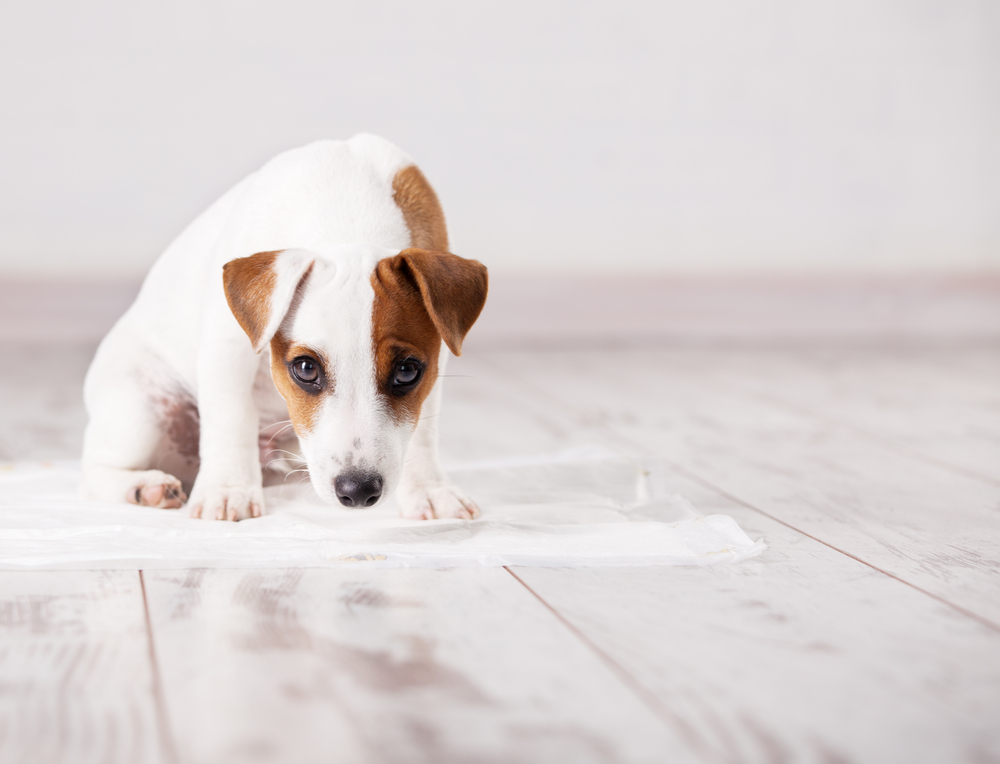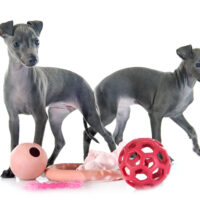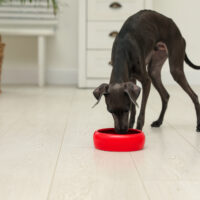Working From Home With An 8-Week-Old Puppy

Over centuries, dogs have become ‘mans-best-friend’ and now is no different. People are looking for companions while working from the comfort of their own homes.
But, however cute and adorable dogs are, looking after a puppy is a different ball game. Working from home with an 8-week-old puppy is hard work, but never-less, it’s rewarding if done correctly.
Here is a short guide on what to consider if you plan to work from home with an 8-week-old puppy.
What’s the best puppy to work from home with?
Buying a dog is a huge responsibility and commitment for years to come. It’s important not to rush into anything without considering how the pup will fit into your lifestyle and how the dog will fit into yours. Your Furry friend will need plenty of exercise, feeding, and grooming and you must set time aside for him/her to care for and play.
When considering a dog, it’s important to also consult with the people living or working in the same place such as family or co-workers.
Most dogs are suitable for countryside living, but not all are suitable for city life, so this would have to be considered. As an example, It would not be fair for a Dobermann to live in a small apartment or office cubical as it may spark behavioural issues as they need lots of space, whereas Chihuahuas may love to spend time with you in an apartment as they are a small breed of dog.
Pedigree dogs
According to the Kennel Club, there are 221 breeds of pedigree dogs to choose from! And all have different quirks and characteristics. Compared to Mongrals, Pedigree dogs have a recorded ancestry.
How do I pick a Pedigree puppy?
Once you have shortlisted a few pedigree puppies which are suited to your living conditions it’s time to consider the following:
Boy or girl Puppy?
The female dog will come into season every 6–9 months and must be distanced from the male dogs or you may have more puppies on your hands. Castrating the male and spaying the girl will prevent this and usually does not affect the character.
Mongrel dogs
Mongrel dogs are generally more healthier than Pedigree dogs because their gene pools are larger. But. because of this, there is no guarantee on the dominant genes so dogs may grow larger or smaller, or be smarter/dumber than expected.
There are many puppy farms that treat dogs badly. When buying from these puppy farms dogs are more likely to catch diseases and be less physically/mentally stable later on in life.
Finding a breeder
Finding a reputable breeder is extremely important. These can be found at dog shows/exhibitions. When looking for breeders check reviews online and meet in the location of the puppies and mother.
It’s important to meet the mother of the puppy, so you know what to expect when your puppy grows up. Observe the mum’s temperament and character.
Look for any discharge from the eyes, mouth and anus of the puppies. If you notice anything out of the ordinary, don’t take the puppy.
Sometimes breeders have genetic tests done on their dogs so you know the probability of any abnormalities, it does no harm in asking if they have such tests.
Bringing the 8-week-old puppy home
The best time to bring a puppy home is when he/she is 8 weeks old as this is the best time for a puppy to settle in and be introduced to new sounds, smells, tastes and experiences.
When picking the new puppy up for the first time at least two people should be in the car so the puppy can go on the passenger’s lap. Take a towel and some tissues as the puppy may get travel sickness. Be mindful about letting the puppy outside as the puppy will not be fully vaccinated and will probably be more acceptable to illnesses.
Settling in your 8-week-old puppy
Preparing the equipment and buying all the bowels and bedding prior to the puppy coming home will help the puppy settle in and feel more comfortable. If possible, try to mimic the breeder’s setup to help the puppy feel more at home. Some breeders will give you a small blanket that smells of the dog’s brothers, sisters and mother.
The first few days
Let the puppy have the freedom to explore the new home. Comfort and reassure the new pup as the old family is no longer present. Certainly don’t leave the puppy on his/her own. This time is very important for future bonding.
Having toys that your pup can play with is a good idea to prevent scratching and biting expensive furniture.

Feeding the puppy for the first time
Be careful about what the new pup eats. It’s not the time to get experimental with food. Try to keep to the same food that the breeder gave to the puppies and that the dog is used to. Keeping to the same brand of biscuit/meat cold or cooked food will prevent the puppy from getting an upset stomach and avoid digestive issues.
Puppies are small so they have tiny stomachs, so should be fed in small amounts frequently. Rather than one big meal. After time you can reduce the frequency of meals.
At 5-6 months old it will be possible to reduce the number of meals to 1-2 meals a day.
Just like all animals, including us; Some puppies may be fussy eaters and may have to be tempted to eat. Setting up routines can help with this. Should the puppy not eat his/her food pick it up and throw it away/store it in the fridge until the next meal.
There are many great brands of food to feed your pup. Some well-known brands include: Pedigree, James Wellbeloved and Purina. Modern puppy food provides calculated nutrients for all growing dogs so extra supplements and vitamins are rarely needed unless advised by your vet.
Should you have more than one dog, make sure that they are all getting enough food. If you have a cat, make sure the dog does not eat the cat food!
Night-time with an 8-week-old puppy
It’s very natural for your puppy to cry at night for the first week or two, which means you may not get much sleep! After all, your pup is missing his siblings and mother.
Puppies don’t usually like sleeping alone so you may be inclined to put on the radio quietly to trick the puppy into thinking he/she’s not alone.
Puppies will appreciate a snug bed that they can call their own. If possible you could add something from his previous home that the puppy can relate to and feel more comfortable with. If buying a plastic bed, make sure the size will fit the dog when fully grown.
Many people keep their puppy on a dog bed or blanket in the kitchen or uncarpeted area. As you can imagine, the consequences of leaving a new puppy overnight on a carpet may involve you washing the carpet of faeces and urine the following morning., which isn’t ideal.
Crying at night
Puppies can start crying and howling in the night as he is expecting to be heard and answered. When this happens, the best thing to do is try to ignore it. If you react every time this happens, this will become a future habit. The odd occasional howling, of course, may mean that your pup needs to pass urine. To prevent this, remember to take your dog out for a toilet trip before nighttime.
House training a puppy
House training should start soon after your puppy has settled in, if not when the puppy moves in. Some puppies are trained by the breeder.
It’s important to always be patient with your dog as each puppy is different and grasps toilet training and different times. Some breeds of dogs learn more quickly than others. Dogs are quicker to toilet-train than human children.
Don’t worry if your dog does not lift its leg when urinating. This usually happens after 12 months.
You will have to watch your puppy very carefully so that he/she does not urinate inside the house on any expensive carpet or piece of furniture. Keeping the puppy separate from these areas is a wise move.
Puppies usually always urinate a few minutes after a drink and first thing in the morning. Some dogs also urinate when excited and meeting new people or somebody they love.
Taking the puppy out and about.
If you want your house to smell fresh, it’s important to take your puppy out with you whether its snow or sunshine.
When taking your dog outside, use two or more words so the puppy can start to understand and recognise what they mean.
How do I use the newspaper to house-train my puppy?
For years many people have been using newspapers to train puppies. The trick is to lay some newspaper by the door and every time you catch your puppy going to the toilet, move him/her on the paper, the smell and habit of doing this will teach the dog where to go.
With persistence, the puppy with start to use the paper when going toilet. When your puppy has grasped the idea, try moving the newspaper outside and see what the dog does. Should you catch the dog going to the toilet inside pick him/her up and relocate to the garden quickly.
Accidents will happen, but that’s the only way to learn. If the dog does go to the toilet where you don’t want him/her to. Disinfect the spot and remove all traces. The slightest small can encourage the puppy to do the same again.

House training puppies take time
House training can be stressful, but it’s worth the effort long term. Once puppies are trained properly, it’s something that stays with the dog for life.
When your puppy goes to the toilet in the right place it’s effective to praise him/her with a treat or a favourite toy.
Introducing other pets to the puppy
If you have other pets at home or are planning to take your puppy to your workplace, you may be asking yourself how your puppy with get along with them.
It’s very possible to introduce your puppy to other dogs, as well as to other species of pets. Introductions should be made gradually and in good time under your present, watchful eye.
Will my puppy be ok with my colleague’s cat?
Relationships between cats and dogs will take time and at the start, they should not meet in close proximity. The cat may scratch the puppy with lightning reflexes and cause damage such as blindness. Should the cat and dog be in the same room, usually the cat will keep away, on higher ground.
Dogs and cats can become friends, and even live happily together, sharing spaces and playing games.
Cats and dogs should always be fed in different locations at different times. Animals will defend themselves through natural instinct when there’s food involved.
Will my puppy be ok with my colleague’s older dog?
Dogs with an age difference can get along, but puppies do have a tendency to irritate larger dogs with puppyish behaviours, which the older dog is beyond entertaining. Older dogs can snap and become aggressive when puppies are too energetic.
It’s important for puppies to meet other dogs. Socialising at a young age is important if you want your dog to get on with other dogs later on.
Many people take their puppies to training/behaviour classes. Dogs can meet greet and play with each other confidently in a designated space.
Are puppies ok with smaller pets?
Be careful when introducing puppies to small pets such as rabbits, hamsters, mice, guinea pigs or other small animals. In the wild, dogs eat small animals!
Dogs can only be introduced to small animals under strict supervision. Chasing and frightening smaller pets should not be tolerated.
Many breeds of dogs can learn to live with these small pets, but it takes some time. It’s unlikely that Terriers such as Scotties will be able to tolerate any small pet.
Dangers for puppies while working from home
Your home can be a dangerous place for a puppy. Not just inside the home, but outside as well.
Outside
Sometimes when working on an urgent project your pup starts howling or barking for a toilet. Obviously, the first reaction is to let the put outside so he can do his business. While your pup is outside, you should be watching or joining your puppy.
When your pup heads outside, be mindful of the following:
- Garden equipment and sharp objects should be kept/stored away along with any chemicals.
- If using weed killer, rat poison, or slug pellets make sure it’s ok to use around puppies and dogs. Usually, it isn’t!
- Fences should be secure and puppy escape-proof with no holes
- Make sure plants aren’t poisonous
- Other small pets if you have any are not lost or at puppy reach.
- Drains are covered
- Holes
Inside
Consider where you will be working. If you are working upstairs, will your puppy need to work upstairs with you as well? Some people don’t let their dogs go upstairs because if the dog starts to go everywhere you go, they may think they are equal and there may be some behaviour issues and think they are the alpha, like many Dobermanns do.
Electrical hazards
Puppies love nothing more than chewing things, if you are busy working and your puppy is getting bored… The puppy may consider biting dangerous electrical wires. To prevent this from happening; furniture could block the wires, computers could be unplugged when not used, and wires could have covers.
A tidy desk means a tidy mind
This doesn’t mean you should pile the rubbish on your desk onto the floor. When puppies find things on the floor they assume that it’s theirs, and you’ve gifted them it.
Make draws puppy-proof
Office draws are excellent places to hide chocolate among other things which may cause harm to your best friend. Chocolate is very poisonous for dogs and can cause death in puppies. More hazards in the workplace can be found here
Is it responsible to work from home while looking after an 8-week-old puppy?
Working from home while looking after a puppy is a great thing but time and commitment to the puppy’s training and health and well-being should be prioritised. The time you dedicate to your dog at this young age will impact its whole adult life.
If you cannot dedicate the time and dedication to a puppy, maybe it would be worth looking into an older dog that is already trained and doesn’t require as much energy. Basset hounds are excellent companions to have around when working remotely from home.


